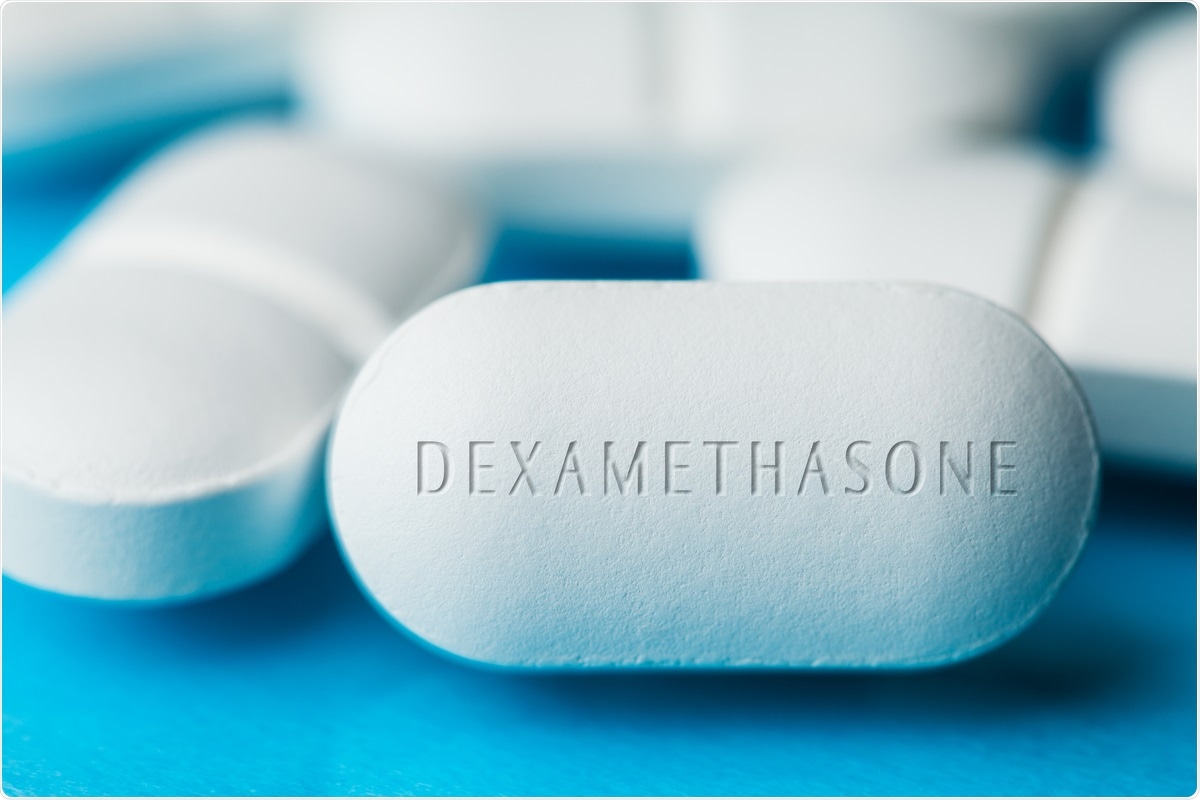Dexamethasone has been highlighted as an effective medicine against severe coronavirus disease 2019 (COVID-19) since the early stages of the pandemic, being more potent with a longer plasma half-life than endogenous glucocorticoid cortisol. The mortality of patients that receive mechanical respiratory assistance is around one third lower when the patient receives dexamethasone, and one fifth lower in patients that receive O2 supplementation without mechanical support, indicative of moderate SARS-CoV-2 infection, while mild cases of COVID-19 gain no benefit from dexamethasone.
Interestingly, for other diseases with otherwise similar respiratory symptoms such as influenza, pneumonia or bacterial sepsis, dexamethasone is contraindicated, with the potent anti-inflammatory and immunosuppressive effects of the glucocorticoid aggravating the infections.

The possible mechanisms that result in dexamethasone being an effective drug against severe SARS-CoV-2 infection are investigated in a new study recently published in the International Journal of Molecular Sciences. The paper’s authors advance the hypothesis that SARS-CoV-2 infection induces cell-specific insensitivity to glucocorticoids, possibly as an unintentional result of the viral replication cycle.
Glucocorticoids
Glucocorticoids generate diverse and strong suppressive effects on the overall immune system, generally exerting an anti-inflammatory effect by downregulating the production of proinflammatory molecules such as interleukin. They can also enhance the clearance of foreign antigens and dead cells from areas of inflammation by stimulating phagocytosis of macrophages and reportedly suppress cellular immunity while stimulating humoral immunity by modulation of the production of cytokines.
While the suppression of a damaging immune response by glucocorticoids can be beneficial, it does nothing to prevent viral replication, and in fact, impedes the ability of the host to fight infection. However, the viral load of SARS-CoV-2 does lower under dexamethasone administration in severe cases. The leading theory, then, is that the drugs appear effective at treating COVID-19 not only because of the lessened organ inflammation experienced by those receiving dexamethasone, but also due to some additional therapeutic properties brought about uniquely during SARS-CoV-2 infection.
Glucocorticoid insensitivity
Glucocorticoid insensitivity has been noted specifically in SARS-CoV-2 infected cells, and a similar state has been reported in some other viral infections. The group state that SARS-CoV-2 likely induces coincidental glucocorticoid resistance during the process of shifting host cellular functions towards its own replication, and while undertaking the process of modulating the innate immune system.
This is supported by observations that SARS-CoV-2 infection activates transcription factors NFκB and AP-1 in host cells, which are known to suppress glucocorticoid receptor activity. Additionally, downstream interferon factors are activated by SARS-CoV-2 that share a coactivator with glucocorticoid receptors, meaning that they could be exhausted by the processes caused by the virus before they can be utilized.
A number of other theories have been proposed to account for the apparent beneficial effect of dexamethasone against COVID-19, contrary to other similar diseases. Cortisol is secreted as part of the hypothalamic-pituitary-adrenal axis, and it has been suggested that insufficient activation of this system could result in severe COVID-19, and that therefore supplementation of the immune-suppressing function of endogenous cortisol is the reason for the observed benefit. Improved lung regeneration has also been suggested, as glucocorticoids are known to have a positive effect on lung surfactants and lung maturation. Additionally, the particular lung cells that SARS-CoV-2 favors are particularly resistant to glucocorticoids, which may go some way to explain the difference observed between COVID-19 and influenza in glucocorticoid response.
Conclusion
Glucocorticoids are effective at suppressing inflammation in other infectious diseases, though poorly suppress pathogen invasion and replication. In the case of SARS-CoV-2, however, intracellular glucocorticoid signaling systems are highly interconnected with the life cycle of the virus. Advanced SARS-CoV-2 infection suppresses innate cellular immunity and induces cell cycle arrest to facilitate better viral replication, and in doing so, modulates the intracellular actions of glucocorticoid receptors.
By making the host cells less susceptible to dexamethasone, SARS-CoV-2 may prevent the glucocorticoid from suppressing host cell immunity as greatly, while allowing it to suppress inflammation in non-infected regions. Administration with interferon has been shown to present synergistic effects with dexamethasone against SARS-CoV-2, and careful studies will be needed to reveal the optimal timing and dosage combination considering the antagonistic effects of each drug.
- Tomoshige Kino, Irina Burd and James H. Segars (2021) Dexamethasone for Severe COVID-19: How Does It Work at Cellular and Molecular Levels? International Journal of Molecular Sciences. https://doi.org/10.3390/ijms22136764, https://www.mdpi.com/1422-0067/22/13/6764.
Posted in: Medical Science News | Medical Research News | Disease/Infection News
Tags: Anti-Inflammatory, Cell, Cell Cycle, Coronavirus, Coronavirus Disease COVID-19, Cortisol, Cytokines, Dexamethasone, Drugs, Glucocorticoid, Immune Response, Immune System, Infectious Diseases, Inflammation, Influenza, Intracellular, Medicine, Mortality, Pandemic, Pathogen, Phagocytosis, Pneumonia, Receptor, Respiratory, SARS, SARS-CoV-2, Sepsis, Transcription, Transcription Factors, Virus

Written by
Michael Greenwood
Michael graduated from Manchester Metropolitan University with a B.Sc. in Chemistry in 2014, where he majored in organic, inorganic, physical and analytical chemistry. He is currently completing a Ph.D. on the design and production of gold nanoparticles able to act as multimodal anticancer agents, being both drug delivery platforms and radiation dose enhancers.
Source: Read Full Article
